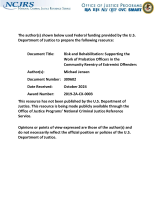Sandhills Vocational Delivery System Experiment: An Examination of Correctional Program Implementation and Effectiveness
Date Published
1987
Agencies
NIJ-Sponsored
Publication Type
Program/Project Evaluation





